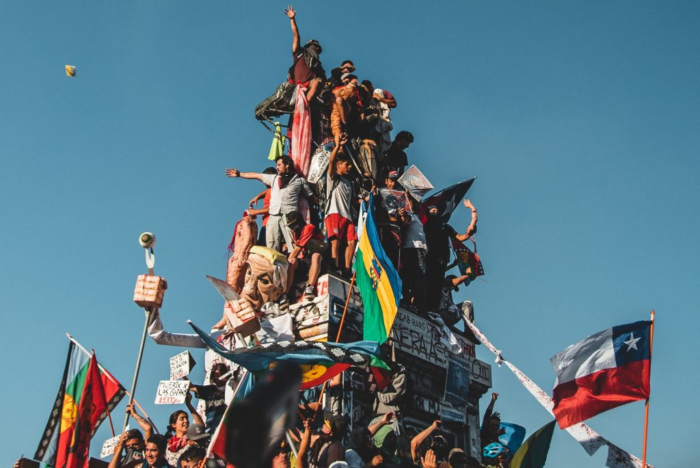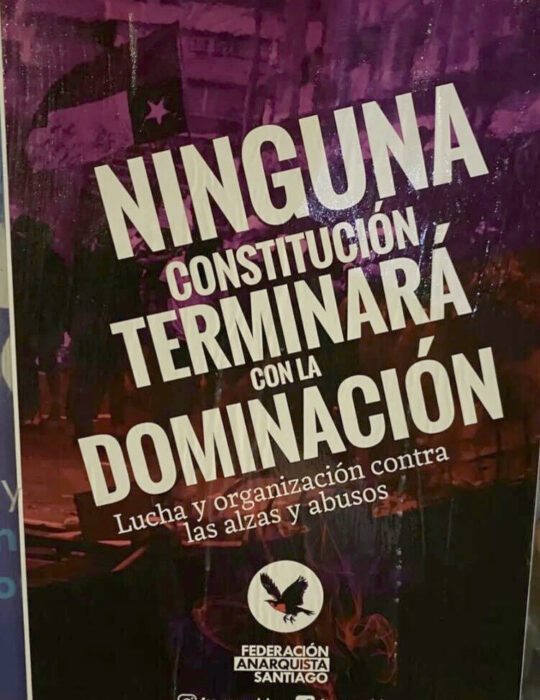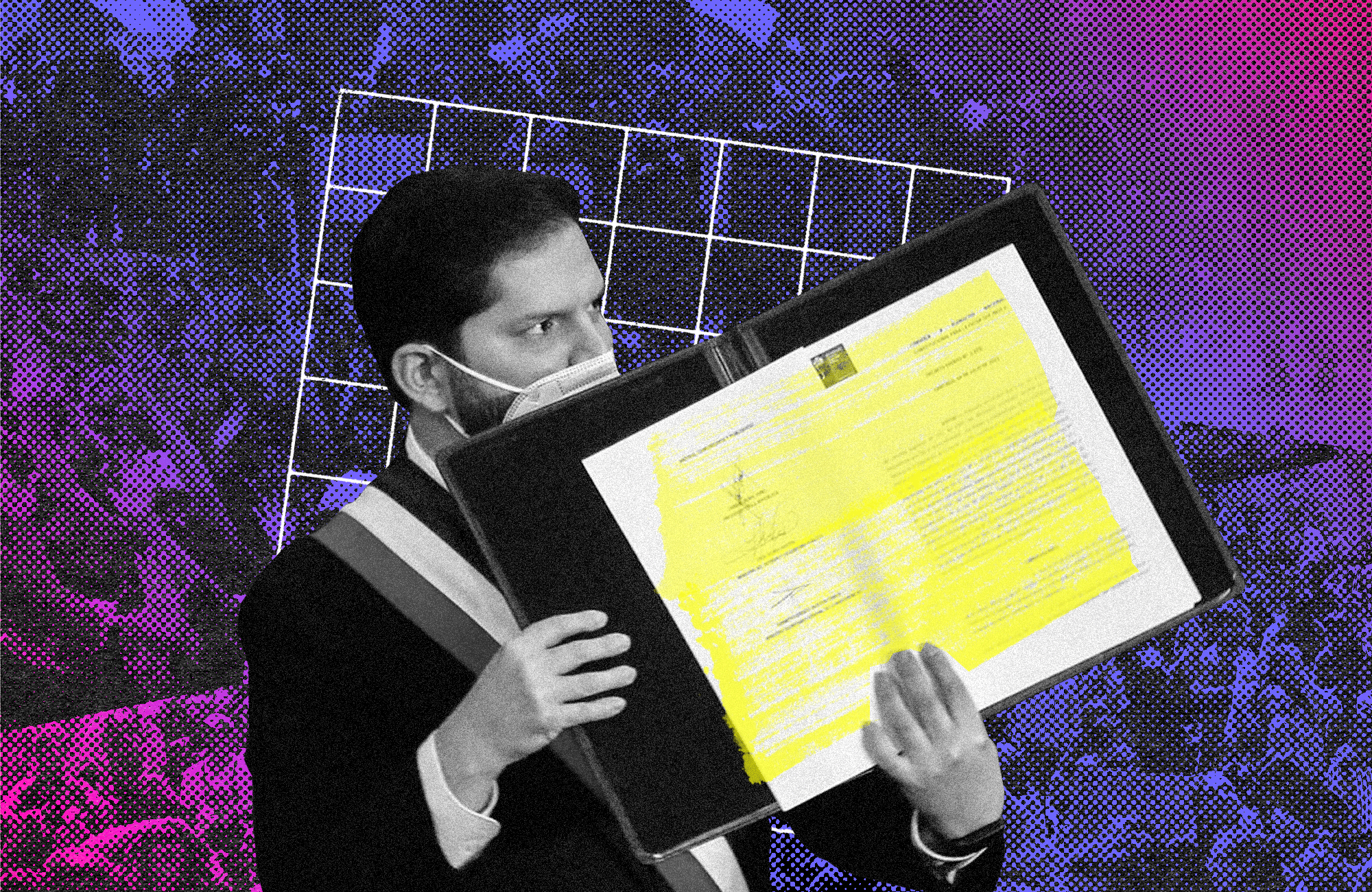Context and Introduction
by Black Rose/Rosa Negra External Education Committee
Translation by Black Rose/Rosa Negra International Relations Committee
Beginning in late 2019, millions of people began taking to the streets across Chile. Initially sparked by a student protest against public transit fare hikes, the mass demonstrations soon took on a popular character, with participants demanding redress for decades of stark social inequality. Massive marches and pitched battles with the police took place over a period of months, during which thousands were arrested, injured, maimed, and some even killed. As well, in the midst of the uprising, neighborhood assemblies were constructed and an ecosystem of social activity emerged.
Unable to contain the social upheaval, Chile’s then president Sebastián Piñera offered a national referendum on the question of entirely rewriting the country’s dictatorship era constitution. With 78% of voters in favor, the process of drafting a new constitution began in 2021 and was completed in mid 2022. Now, on September 4th, Chileans will go to the polls to decide whether to accept or reject the constitutional convention’s draft document.
We share here a translation of a public opinion letter on these events, produced by our Chilean sister organization Federación Anarquista Santiago (FAS).
Note: The positions articulated here do not necessarily reflect those of Black Rose / Rosa Negra as an organization.
Original Spanish version below.
Opinion Letter: Position on the constitutional plebiscite of September 4, 2022
Federación Anarquista Santiago (FAS) [@fas_anarquista]
In our political organization we understand that the primordial questions of the class struggle cannot be resolved in a juridical-institutional framework, therefore, no constitution will resolve the problems that affect our emancipation. That is why we characterize this process as the restitution of state power, which, in the face of an evident crisis of the social pact imposed by the coordinated transition in the post-dictatorship period, sought to give oxygen to the system of domination. Hence we conceptualize the above as a “restitution process”. In short, the task of the convention was to update the limits of our oppression and exploitation, in order to revalidate our submission to the ruling class.
The text emanating from the Convention left much of its content up to the laws and regulations to be approved by Congress, that is to say, to reformism, consolidating its Concertationist1 spirit. It made a constitutional proposal with decrees and principles but its final content and implementation will depend on Congress, which will lead us, once again, to a feedback loop of clientelism and extortion, where the parties of “approvalism”2 will call on the popular sectors to vote for them, under the promise that “yes, now yes” the longed-for dignity will come. And if the above were not enough, the governing parties have already agreed on changes to the constitutional proposal, if it wins the upcoming election. Therefore, those decrees and principles that have generated most controversy in the party of order should already be understood as discounted, since their repeal has already been promised.
We believe that overthrowing the constitution of the Dictatorship and its legacy allows us to improve the conditions of struggle. However, we understand that it is only a symbol, full of “small letters,” which alone will not guarantee a dignified life for our communities, since the pillars of Pinochetism3 and conservatism are not only anchored in the Constitution but are intrinsic to the economic and social model that will not be overthrown by voting, on the contrary, it will be through the effective capacity we have in social organizations that we will build, through struggle, the new world that we carry in our hearts. However, various social and political organizations abandoned the flags of direct action raised during the Social Revolt, even becoming part of the government of Gabriel Boric. In this way, organizations that at one time sought a radical transformation in our lives and fomented struggle and popular protagonism, have assumed the political theses of reformism, aiming to confront neoliberalism through the democratic opening and the construction of a new type of state.

This has translated into giving all their organizational and militant efforts to the electoral process, abandoning the work of strengthening social organization. Consequently, this September 4 is intended to turn the page, to leave the Social Revolt behind: that is the wager of the party of order, which puts us in a complex post-plebiscite scenario; the hollowing out of streets and popular protest will be deepened in exchange for concentrating efforts on implementation and institutional capture. For us, this is a serious mistake, given that we lose political autonomy and the construction of a social force with the capacity to fight, our two main tools for opening up contested scenarios. This political context, which is otherwise risky, can leave us facing a supposed tactical victory, such as the collapse of the constitution of the dictatorship, but clearly it is, above all, a strategic defeat that represents the demobilization and weakening of social and political organizations.
Finally, in the face of electoral opportunism and the pacification of social conflict, which has only benefited progressivism, a kind of “post-revolt depression” has been generated — dignity has not become a habit but apparently resignation has. Due to the above, rather than returning to a position that we have made quite clear since 2019 regarding the restitution process, we want to focus on presenting a reflection and appeal to social and organized anarchism: we believe that after experiencing a sharpening of the class struggle since the Social Revolt, it is intolerable that we continue to set the pace. It is no use clinging religiously to ideological principles, especially when reality is tremendously complex and contradictory, that is why we must dare, we must be uncomfortable, we must set fire to sectarianism, we must abandon contemplation and contribute to the consolidation of a real revolutionary project, otherwise we will continue to hold positions in the air that contribute little or nothing to the emancipation of our class.
We believe it is necessary to reactivate popular protest and organization, rejecting the institutional siren songs and challenging the pusillanimous positions of those who prefer to remain silent in the face of abuses and injustices in order to “protect Approval.” Our path is one of struggle, not of conciliation, we are invested in conflict but without a concrete political project it will be nothing more than an empty slogan. Therefore, our proposal is to strengthen social organizations and community management in terms of rupture for the construction of Self-managing Revolutionary Power, which is nothing more than the capacities and forces necessary to advance towards the construction of organized communities and territorial control, in order to, in this way, throw the bourgeoisie and its world into the dustbin of history.
No constitution will end domination
To strengthen struggle and organization
Freedom for political prisoners
Federación Anarquista Santiago / Santiago Anarchist Federation
Notes:
[1] This is a reference to Concertación, a coalition of center-left political parties founded in 1988.
[2] This refers to those who are behind the “Apruebo” or “Approve” campaign to adopt the new constitution.
[3] This refers to the dictatorship of Augusto Pinochet, a Chilean military general who came to power through a coup d’etat, backed by the United States, in 1973, which ousted the democratically elected government of socialist Salvador Allende. Pinochet’s reign lasted from 1973-1990.
Carta Opinión: Posicionamiento ante el plebiscito constitucional del 4 de Septiembre 2022
Desde nuestra organización política entendemos que las cuestiones primigenias de la lucha de clases no pueden resolverse en un marco jurídico-institucional, por ende, ninguna constitución resolverá las problemáticas que afectan a nuestra emancipación. Por ello es que caracterizamos este proceso como la restitución del poder estatal, el cual, ante una evidente crisis del pacto social impuesto por transición concertada en el marco de la post-dictadura, busco oxigenar al sistema de dominación, de allí que conceptualizamos lo anterior como “proceso restituyente”. En suma, la tarea de la convención era actualizar los límites de nuestra opresión y explotación, para así, revalidar nuestro sometimiento a la clase dominante.
El texto emanado de la Convención dejo gran parte de su contenido a las leyes y reglamentos que apruebe el Congreso, es decir, el reformismo, consolidando su espiritu concertacionista, hizo una propuesta constitucional con sentencias y principios pero su contenido final e implementación dependerá del Congreso, lo cual, nos llevará, nuevamente, a un bucle de clientelismo y chantaje, en donde los partidos del “apruebismo” llamaran a los sectores populares a votar por ellos, bajo la promesa de que “ahora si que si” llegara la ansiada dignidad. Y si lo anterior no fuera suficiente, los partidos de gobierno ya han pactado cambios a la propuesta constitucional, si es que esta gana la elección venidera, por ende, aquellas sentencias y principios que han generado más controversias en el partido del orden ya deben darse por descontadas, pues su derogación ya ha sido comprometida.
Consideramos que derribar la constitución de la Dictadura y su legado permite mejorar las condiciones de lucha. Sin embargo, entendemos que es solo un símbolo, lleno de “letras chicas,” que no garantiza por sí sola una vida digna para nuestras comunidades, dado que los pilares del pinochetismo y el conservadurismo no sólo se encuentran anclados en la Constitución sino que son intrínsecos al modelo económico y social que no lograra ser derribado con un voto, por el contrario, será a través de la capacidad efectiva que tengamos desde las organizaciones sociales para construir, a partir de la lucha, el mundo nuevo que llevamos en nuestros corazones. No obstante, diversas organizaciones sociales y políticas dejaron las banderas de la acción directa levantadas durante la Revuelta Social, haciéndose incluso parte del gobierno de Gabriel Boric. De esta manera, organizaciones que en un momento buscaban una transformación radical en nuestras vidas y fomentaban la lucha y el protagonismo popular, han asumido las tesis políticas del reformismo, apuntando a enfrentar el neoliberalismo desde la apertura democrática y la construcción de un Estado de nuevo tipo.
Esto se ha traducido en entregar todos sus esfuerzos organizativos y militantes al proceso electoral, abandonando el trabajo de fortalecer la organización social. En consecuencia, este 4 de septiembre se pretende dar vuelta a la página, dejar atrás la Revuelta Social: esa es la apuesta del partido del orden, lo que nos pone en un escenario post plebiscito complejo; se profundiza el vaciamiento de las calles y la protesta popular a cambio de concentrar los esfuerzos en las implementación y el copamiento institucional. Para nosotrxs esto es un grave error, dado que, se pierde la construcción de fuerza social con capacidad de lucha y autonomía política, nuestras dos principales herramientas para abrir escenarios de disputa. Dicho contexto político, arriesgado por lo demás, nos puede dejar frente a una supuesta victoria táctica, como el derrumbe de las constitución de la dictadura, pero claramente es, sobre todo, una derrota estratégica que representa la desmovilización y el debilitamiento de las organizaciones sociales y políticas.

Finalmente, frente al oportunismo electoral y la pacificación del conflicto social, que solo ha beneficiado al progresismo, se ha generado una especie de “depresión post Revuelta,” la dignidad no se hizo costumbre pero al parecer la resignación si. Por lo anterior, más que redundar en una posición que hemos dejado bastante clara desde el año 2019 respecto al proceso restituyente, queremos enfocarnos en presentar una reflexión y llamamiento al anarquismo social y organizado: creemos que tras vivir una agudización de la lucha de clases a partir de la Revuelta Social, es intolerable que sigamos marcando el paso. De nada sirve aferrarse religiosamente a principios ideológicos, sobre todo cuando la realidad es tremendamente compleja y contradictoria, por ello, es que hay que atreverse, hay que incomodarse, hay que incendiar el sectarismo, hay que abandonar la contemplación y aportar a la consolidación de un real proyecto revolucionario, sino seguiremos sosteniendo posiciones en el aire que poco y nada contribuyen a la emancipación de nuestra clase.
Creemos necesario reactivar la organización y la protesta popular, desechando los cantos de sirena institucionales y desafiando las posiciones pusilánimes de quienes prefieren guardar silencio frente a los abusos e injusticias con tal de “proteger al apruebo”. Nuestro camino es de lucha, no de conciliación, apostamos por el conflicto pero sin un proyecto político concreto no será más que una consigna vacía, por ello, nuestra propuesta es el fortalecimiento de las organizaciones sociales y la gestión comunitaria en clave de ruptura para la construcción del Poder Revolucionario Autogestivo, el cual, no es más que las capacidades y fuerzas necesarias para avanzar a la construcción de comunidades organizadas y el control territorial, para, de esta manera, arrojar a la burguesía y a su mundo al basurero de la historia.
Ninguna constitución terminará con la dominación
A fortalecer la lucha y organización
Libertad a lxs presxs politicxs
Federación Anarquista Santiago
If you enjoyed this article, we recommend Libertarian Socialism in South America: A Roundtable Interview, Part I, Chile and One Month Since the Start of the Popular Revolt in Chile: Feminist and Libertarian Communist Statement.

